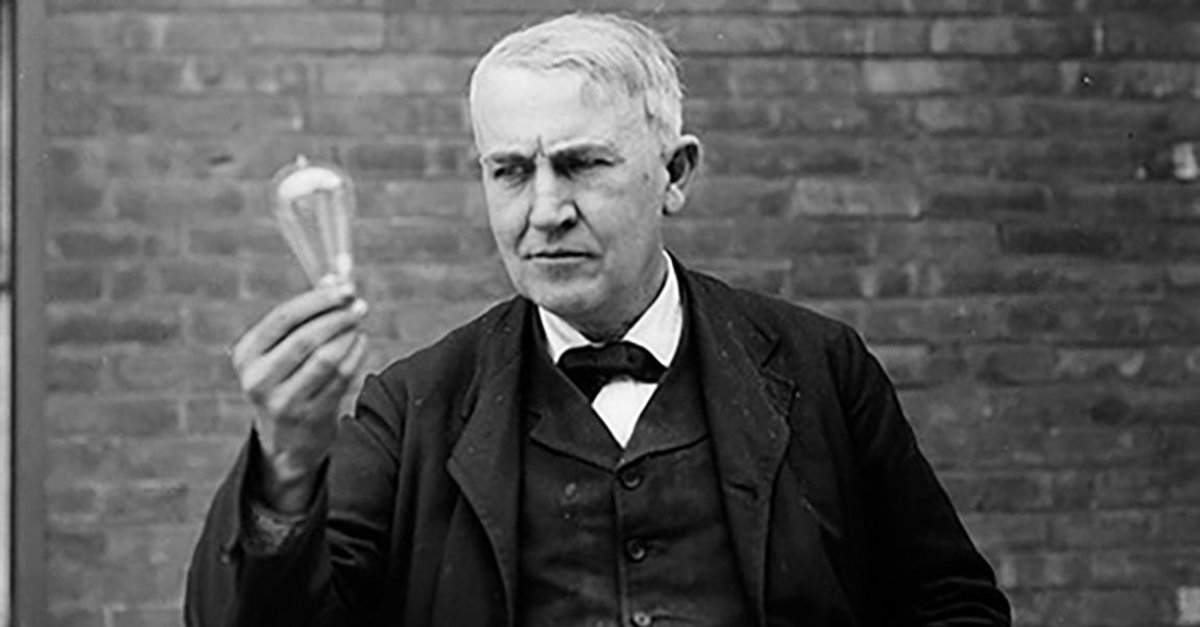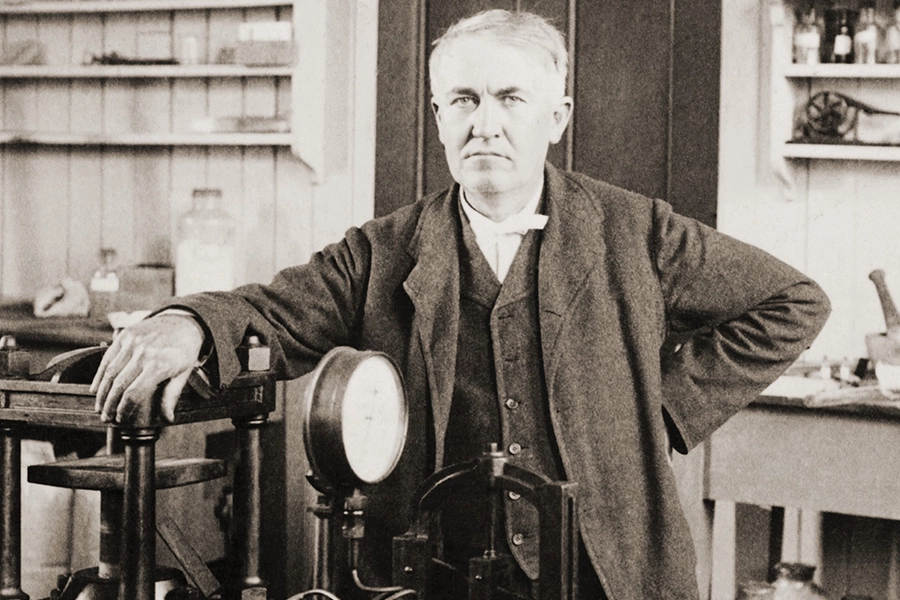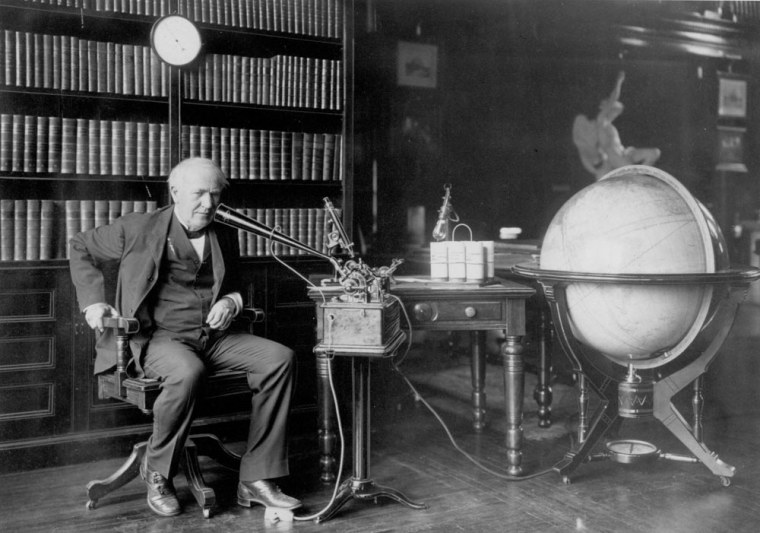Electrifying Progress: The Legacy of Thomas Edison

Early Life and Education:
Thomas Edison was the seventh and youngest child of Samuel Ogden Edison Jr. and Nancy Matthews Elliott. His early years were marked by curiosity and a thirst for knowledge, traits that would shape his future as an inventor and entrepreneur. Edison received only a few months of formal education, as his mother, a former schoolteacher, decided to homeschool him due to his frequent bouts of illness. Despite his lack of formal schooling, Edison developed a lifelong passion for reading and self-education, devouring books on science, technology, and experimentation.
Early Career and Entrepreneurship: At the age of 12, Edison began working as a newsboy on the Grand Trunk Railroad, where he set up a small laboratory in one of the baggage cars to conduct experiments and invent gadgets. His entrepreneurial spirit soon led him to launch his first business venture, selling candy, newspapers, and vegetables to passengers on the train. In 1862, at the age of 15, Edison became a telegraph operator, working for various telegraph companies across the Midwest. His experience in telegraphy would prove invaluable in his later career as an inventor.
At the age of 12, Edison began working as a newsboy on the Grand Trunk Railroad, where he set up a small laboratory in one of the baggage cars to conduct experiments and invent gadgets. His entrepreneurial spirit soon led him to launch his first business venture, selling candy, newspapers, and vegetables to passengers on the train. In 1862, at the age of 15, Edison became a telegraph operator, working for various telegraph companies across the Midwest. His experience in telegraphy would prove invaluable in his later career as an inventor.
Innovations and Inventions:
Throughout his life, Thomas Edison would go on to develop over 1,000 patents for inventions ranging from the practical to the revolutionary. Some of his most notable inventions include the phonograph, the incandescent light bulb, and the motion picture camera. In 1877, Edison unveiled the phonograph, a device capable of recording and reproducing sound, which revolutionized the entertainment industry and laid the groundwork for modern audio recording technology. In 1879, he patented the first commercially viable incandescent light bulb, which transformed the way people lived and worked by providing reliable and affordable electric lighting. And in 1891, Edison introduced the kinetoscope, a precursor to the modern motion picture camera, which paved the way for the development of the film industry.
The Edison Electric Light Company: In 1878, Edison founded the Edison Electric Light Company, which later merged with several other companies to form the General Electric Company (GE). Under Edison's leadership, GE became one of the largest and most influential corporations in the world, pioneering advancements in electric power generation, distribution, and lighting technology. Edison's contributions to the development of electric power systems laid the foundation for the modern electrical grid, which revolutionized industry, transportation, and communication.
In 1878, Edison founded the Edison Electric Light Company, which later merged with several other companies to form the General Electric Company (GE). Under Edison's leadership, GE became one of the largest and most influential corporations in the world, pioneering advancements in electric power generation, distribution, and lighting technology. Edison's contributions to the development of electric power systems laid the foundation for the modern electrical grid, which revolutionized industry, transportation, and communication.
Legacy and Impact:
Thomas Edison's legacy extends far beyond his individual inventions and business ventures. His relentless pursuit of innovation and his commitment to practical problem-solving helped to usher in the modern age of technology and industry. Edison's inventions not only transformed the way people lived and worked but also laid the groundwork for future generations of inventors and entrepreneurs. His influence can be seen in virtually every aspect of modern life, from the electric lights that illuminate our cities to the electronic devices that connect us to the world.
Philosophy and Work Ethic: Edison's success as an inventor was not merely a product of his genius but also of his work ethic and philosophy of innovation. He famously remarked that "genius is one percent inspiration and ninety-nine percent perspiration," emphasizing the importance of hard work, perseverance, and experimentation in the creative process. Edison believed in the value of trial and error, often conducting thousands of experiments before achieving success. His approach to invention, characterized by systematic experimentation and relentless iteration, remains a model for aspiring innovators and entrepreneurs.
Edison's success as an inventor was not merely a product of his genius but also of his work ethic and philosophy of innovation. He famously remarked that "genius is one percent inspiration and ninety-nine percent perspiration," emphasizing the importance of hard work, perseverance, and experimentation in the creative process. Edison believed in the value of trial and error, often conducting thousands of experiments before achieving success. His approach to invention, characterized by systematic experimentation and relentless iteration, remains a model for aspiring innovators and entrepreneurs.
Thomas Edison's life and legacy stand as a testament to the power of human ingenuity and perseverance. His groundbreaking inventions revolutionized technology, industry, and society, paving the way for the modern age of innovation. Edison's entrepreneurial spirit, his commitment to practical problem-solving, and his philosophy of innovation continue to inspire generations of inventors, entrepreneurs, and creative thinkers around the world. As we reflect on his life and accomplishments, we honor his memory and celebrate his enduring contributions to the world.
Challenges and Controversies: Despite his immense success, Thomas Edison faced criticism and controversy throughout his career. One notable controversy surrounds his rivalry with Nikola Tesla, a brilliant inventor and electrical engineer. Edison's promotion of direct current (DC) as the standard for electrical power distribution put him at odds with Tesla, who championed alternating current (AC) as a more efficient and practical solution. The so-called "War of the Currents" culminated in a series of public demonstrations and a bitter dispute over patents and intellectual property rights. While Edison ultimately prevailed in the marketplace, AC would later emerge as the dominant form of electrical power transmission, thanks in part to Tesla's contributions.
Despite his immense success, Thomas Edison faced criticism and controversy throughout his career. One notable controversy surrounds his rivalry with Nikola Tesla, a brilliant inventor and electrical engineer. Edison's promotion of direct current (DC) as the standard for electrical power distribution put him at odds with Tesla, who championed alternating current (AC) as a more efficient and practical solution. The so-called "War of the Currents" culminated in a series of public demonstrations and a bitter dispute over patents and intellectual property rights. While Edison ultimately prevailed in the marketplace, AC would later emerge as the dominant form of electrical power transmission, thanks in part to Tesla's contributions.
Humanitarian Efforts and Philanthropy:
In addition to his achievements as an inventor and entrepreneur, Thomas Edison was also known for his philanthropic endeavors and humanitarian efforts. He was a strong advocate for public education and donated generously to educational institutions, libraries, and scientific research organizations. Edison was a founding member of the National Academy of Sciences and served as its president from 1927 to 1931. He also established the Edison Institute (now known as The Henry Ford Museum) in Dearborn, Michigan, as a tribute to American innovation and entrepreneurship.
Personal Life and Legacy: In his personal life, Thomas Edison was married twice and had six children. He was known for his eccentricities and quirks, including a penchant for working long hours and taking power naps throughout the day. Edison's laboratory in Menlo Park, New Jersey, became a symbol of innovation and progress, attracting visitors from around the world who marveled at his inventions and experiments. After his death on October 18, 1931, Edison was buried in West Orange, New Jersey, where his legacy continues to be celebrated and honored.
In his personal life, Thomas Edison was married twice and had six children. He was known for his eccentricities and quirks, including a penchant for working long hours and taking power naps throughout the day. Edison's laboratory in Menlo Park, New Jersey, became a symbol of innovation and progress, attracting visitors from around the world who marveled at his inventions and experiments. After his death on October 18, 1931, Edison was buried in West Orange, New Jersey, where his legacy continues to be celebrated and honored.
Conclusion:
In conclusion, Thomas Edison's life and legacy exemplify the transformative power of innovation, entrepreneurship, and perseverance. His groundbreaking inventions revolutionized technology, industry, and society, laying the foundation for the modern age of innovation. Edison's legacy continues to inspire generations of inventors, entrepreneurs, and creative thinkers around the world, reminding us of the boundless possibilities of human ingenuity and the importance of relentless pursuit of knowledge and progress. As we reflect on his life and accomplishments, we honor his memory and celebrate his enduring contributions to the world.



































